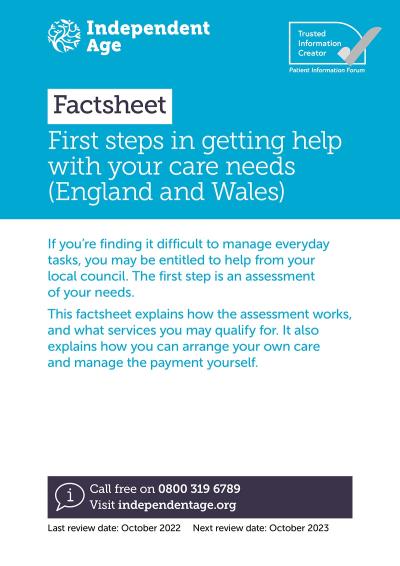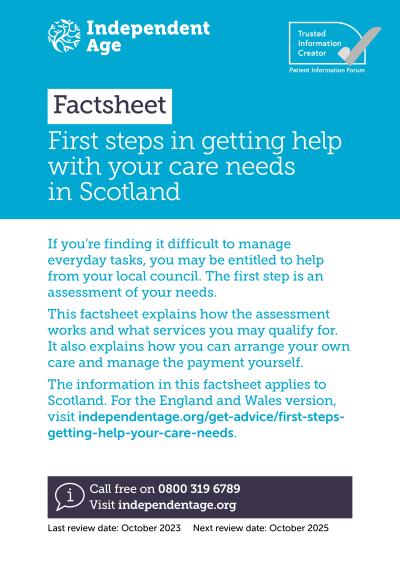Related publications

First steps in getting help with your care needs in England and Wales

If you need help to look after yourself, you could benefit from a care needs assessment from your local council. This will work out what help you need and how you might get it. You can prepare for the assessment and get help to express your views to make sure the council gets a full picture of your needs.
A care needs assessment works out what help or support you need with your care, and how you might get it. It is usually carried out by the social services department of your local council. The council has to give you an assessment if you appear to need care and support, regardless of your income or savings or whether the council thinks you will qualify for their help.
Depending on how complex your needs are, the assessment might involve a face-to-face visit, a phone call or a self-assessment form (in England). Your preferences should be considered.
The assessment is a chance for you to discuss what support you need with a trained professional. They’ll involve you throughout the assessment. You’ll be given a chance to talk about any difficulties you have in looking after yourself and the impact these have on your wellbeing – for example, you might want to continue living independently in your home, but you are finding it difficult to wash and get dressed.
There are various types of help and support the assessment may suggest could help you, including:
If you have a friend or family member looking after you as an unpaid carer, they can get a carer’s assessment at the same time to see if they need support to carry on their caring role.
Urgent assessments
If you’re struggling to cope, perhaps because your needs suddenly increase or your care arrangements break down, ask for an urgent assessment. The council may provide you with an emergency care package until a full assessment can be carried out.
How long should you wait for an assessment?
There are no set timescales for carrying out an assessment but it should happen within a reasonable time and take into account the urgency of your situation. The council should tell you when they think your assessment will take place and keep you informed throughout the process.
If you think you’ve been waiting too long, call the council and ask to speak to someone senior, such as the manager of adult social care, to find out when the process will be completed. You may want to consider making a complaint.
Before your assessment, the council should give you information about the process, including a copy of the questions you’ll be asked. If necessary, they should provide information in an accessible format, such as large print or translated material.
A care needs assessment is your chance to explain what your difficulties are and what support you would like. The person carrying out the assessment can only consider the needs that come up during the assessment so it’s really important that you give them the full picture and don’t downplay your situation. Prepare in advance by gathering information and think about any questions you want to ask. You might want to keep a diary over a week to help you remember all the different things you needed help with (even if you didn’t have that help). This could be especially helpful if your needs change from day to day.
Make a list before the assessment so you can remember what you want to say. Our Preparing for your care needs assessment checklist can help you get ready.
Once you have a date for your assessment
It’s a good idea to arrange to have someone with you during the assessment, such as a relative, friend or carer. You can also ask for other people who play a part in your care to be involved, for example a care worker, a sheltered housing warden or GP. The council must involve anyone you have told them about in advance.
If you have difficulty communicating or understanding information, you may be able to arrange for help from an independent advocate on the day of your assessment.
A trained care professional will ask you about your current situation – for example what tasks or activities you have difficulty with or cannot do at all. The assessment should look at all aspects of your life – emotional, psychological and physical. You must be involved throughout, and your views and wishes must be taken into account as well as your needs.
The aim of the assessment is to work out whether you can do certain things such as:
If your needs often change, the care professional may have to visit you more than once to make sure all your needs are properly assessed over time.
Helpful tips
To get the best out of your assessment:
If you think the assessment didn’t go well, contact social services to ask them to look at the assessment again.
After your assessment, the council will give you a copy of your care needs assessment and explain what your care needs are. If you're not given this, ask. You’ll also be told whether or not your needs are high enough for you to qualify for help from the council.
There are different national criteria for who qualifies for council support in England, Scotland and Wales. You can find out more in our factsheets First steps in getting help with your care needs (England/Wales) or First steps in getting help with your care needs in Scotland.
If you qualify for support
If you meet the criteria for getting social care support, social services will then work out how best to meet your needs. They should develop a written care and support plan with you.
Most people who qualify for council support still have to contribute towards the cost of their care, so you’re likely to also have a financial assessment to work out how much you’ll have to pay. The way this financial assessment works depends on whether you are going to be receiving care at home or in a care home. The financial assessment should only take place after your care needs assessment. For more information, see our Paying for care section.
If you don’t qualify for support
The council will let you know if you don’t meet the criteria for care and support. You can ask for a review if you’re not happy with their assessment or you could consider making a complaint. They should also give you information and advice to help you cope with your situation – for example by telling you about other local services that may be able to help you and how to prevent your needs from getting worse.

To request a care needs assessment, go to gov.uk/apply-needs-assessment-social-services.
See our Preparing for your care needs assessment checklist to help you get ready for your assessment. You could also use this checklist to refer to during your assessment.